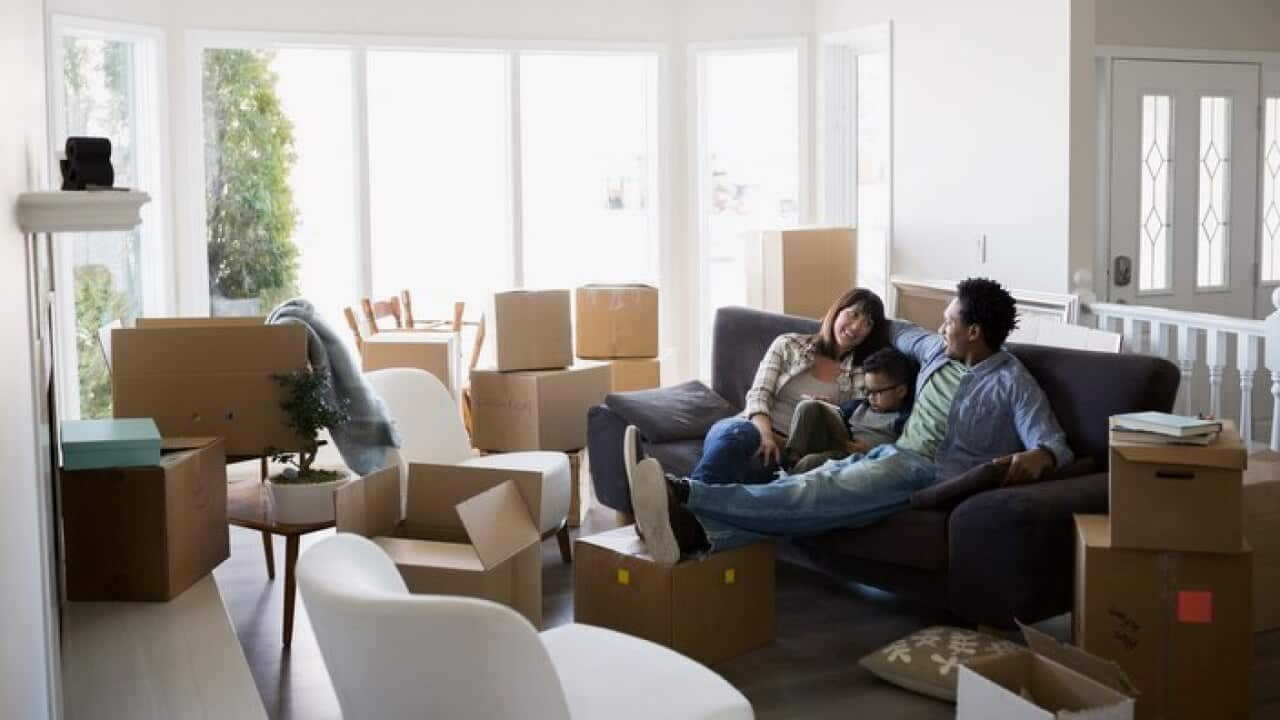Deciding to buy a house comes with a lot of questions. One you need to answer early on is whether you'll buy an established house or build a new one.
There’s no one-size-fits-all answer so let’s look at both options to find out what would suit you best.
Building a new house
The biggest pro of building a new house is that you can customise it to be exactly how you want, in the limits of your budget. You can choose the colours, materials, appliances, etc. Most importantly, you can decide on the configuration and the size of the rooms But that might not be for everybody. It’s a lot of decisions to take, in a short amount of time.
But that might not be for everybody. It’s a lot of decisions to take, in a short amount of time.

Young couple choosing the right color for their wall in new apartment. Source: Getty Images
"Some clients find it very hard to visualise something. They find it very hard to go 'What would this type of house look like on my block of land?'. They will go to display homes and look at stuff online and pictures in magazines and all that kind of stuff, but they still find it sort of challenging to be able to visualise how all it will all fit in and what choices to make," says Blackk founder and mortgage broker Victor Kalinowski.
Another advantage of new houses is how energy efficient they are. “It will cost less to heat and cool. Repair bills are generally lower for new homes because things are relatively new,” says property lecturer and author Peter Koulizos. There are also financial incentives to build a new home, like reduced stamp duty and the .
There are also financial incentives to build a new home, like reduced stamp duty and the .

Source: Getty Images
But location can be an issue. To build, you’ll usually have to go where there is land available, far away from city centres. There might not be as many facilities like schools, public transport, hospitals and shopping centres close by.
Another disadvantage is how long the process takes. It will take several months before you’re able to move in. If you’re looking to live in your house soon, it might not be the best option for you.
Buying an established house
One of the main advantages of buying an established house is that the process is easier. You get to have a look at the finished product and decide if it works for you or not. And the process is quick, you can move in soon after buying. But it might be harder to find the exact configuration you want, especially if you're looking for a big house with several rooms.
But it might be harder to find the exact configuration you want, especially if you're looking for a big house with several rooms.

Family with two boys (4 and 6 years) standing in front of house with FOR SALE sign in front yard. Source: Getty Images
If you want to live in an established area close to the city, an existing house will probably be the only option.
“You know what the surrounding facilities and other homes are like. You know where the community centre is, where the places of worships are, where the shopping centres are. When you buy in a new estate, you don't know. Just because the developer says this is a proposed gymnasium or recreation hall, it doesn't mean that that's what's going to be erected there. Because if the developers fall on hard time, they might decide to do something else with that particular block of land," explains Koulizos.
Estimate and compare the costs
Despite saving money on stamp duty and with the First Home Owner Grant, it doesn’t necessarily mean that building a new house will be cheaper overall. You should estimate and compare the costs between building new and buying established before taking a decision. Try to think ahead and include costs of things like future renovations or having to keep paying rent if construction takes longer than expected.
You should estimate and compare the costs between building new and buying established before taking a decision. Try to think ahead and include costs of things like future renovations or having to keep paying rent if construction takes longer than expected.

Source: Pixabay
Ask yourself these questions
When you start thinking about buying a house, ask yourselves a few questions: Where do you want to live? What kind of house do you want? What can you afford? And most importantly, is the house your ‘forever home’? Or are you planning on selling to upgrade later?
And most importantly, is the house your ‘forever home’? Or are you planning on selling to upgrade later?

Architect drawings of a proposed new house. Source: Getty Images
"If you are going to buy a home and think that in a year of time you're going to sell it and move somewhere else or upgrade to a bigger home, than going to the whole building process, I mean, is it really worth it for that period of time? Whether if you say 'look, I'm thinking of spending the next 15 or 20 years in this home, and I have kids and want them to go to primary school and high school and university from here', that's potentially going to mean it's more worth it than someone who says in 12 months I'm going to move overseas," says Kalinowski.
